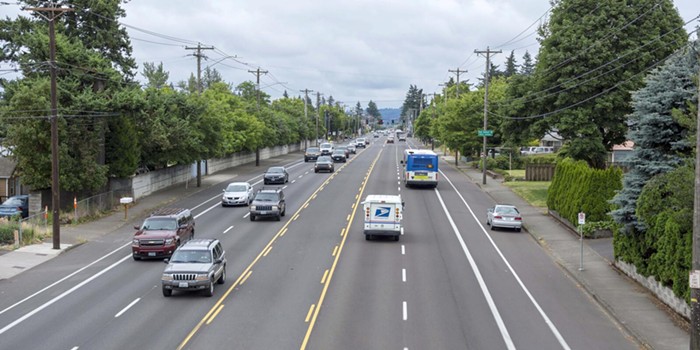DOZENS OF DISGRUNTLED Portlanders rallied—again—in front of Portland City Hall on Friday, January 15, demanding renters' protections in Portland's tight, turbulent housing market.
Portland Tenants United (PTU)—a loosely structured group whose members have been organizing for months via Facebook—put together the event, but a variety of speakers were on hand to offer thoughts. Among them was a speaker named JC Sinn, representing the labor group Industrial Workers of the World. And Sinn, like a growing number of local activists, talked up one of the methods by which tenants have gotten landlords' attention in the past: a rent strike.
"It's the people who really have the power to end this housing crisis by confronting landlords and withholding rents," Sinn told the demonstrators. "Yes, rent strikes. That's what it's going to take to get the working class the power in Portland and around the world."
That term—rent strike—has been on locals' lips more and more lately, as activists say they're disappointed with the city's slow reaction to discriminatory practices and unfair rent increases by landlords. Amid rallies and marches, some say affordable housing advocates need to hit landlords in their wallets by simply refusing to pay up each month.
It's a time-tested tactic. In 1907, 10,000 New York City tenants successfully petitioned for rent reduction through a two-week rent strike. Martin Luther King Jr. led a strike against Chicago "slumlords" in the '60s. Glaswegians staged a rent strike in the early part of the 20th century.
There are present-day examples, too. In San Francisco's chaotic rental market, tenants in a 139-unit, city-owned apartment complex have been striking since August—protesting rent increases of anywhere between 30 and 300 percent—and have no plans to stop until their demands are met.
"We've been able to get through some concessions, but it seems like one hand gives and the other takes away," says Jay Majitov, one of the strikers. "We're happy to pay what we need to, but no one is paying the proposed increase."
But could a rent strike really help with Portland's issues? Though activists like Sinn throw the term around, some longtime local housing equity advocates aren't sure Portland's activist community is organized enough to pull off a successful rent strike.
That's problematic, if true. Experts say organization is paramount.
Peter Dreier, chair of the Urban and Environmental Policy department at Occidental College in Los Angeles, says activists looking to go on strike—that is, stop paying rent until certain demands are met—should go in with clear goals mapped out.
Though landlords with fewer properties might seem more vulnerable, Dreier says they are harder to sway because they have fewer units, and stand to lose less income than landlords who own multiple properties.
"The best thing for tenants is not to just organize in individual buildings, but against big landlords," Dreier says. "And it's best for tenants to keep paying their rent, but to put it in escrow as a show of good faith that they're not trying to get out of paying rent altogether."
To be sure, Portland activists have earned small victories. Earlier this month, PTU members threatened a large local property management company with a loud and public action if the company followed through on its threats to evict a 73-year-old man who'd lived in his apartment for more than 30 years. PTU says the company relented, allowing the man to stay on the condition that the group call off the rally.
Quick results like that have been elusive at Midtown, the San Francisco building where renters have been striking for months. There has been some progress, though. Tenants in the building have effectively delayed their rent increases while the matter is resolved with the city.
Majitov says building solidarity has helped, as has keeping the fight loud and public.
"Hound the mayor. Hound the public officials. Find out where they are and be there. Band together with unions and other community groups," Majitov says. "Nothing of value has ever been given to the masses from the powers that be without a lot of pressure."
Housing advocates in Portland are keeping busy; there are at least nine events scheduled between now and the end of February.
But Dreier says fundamental change requires more than rallies and a rent strike. Housing rights activists need to "act like an interest group" and organize politically.
"A statewide tenants' rights movement could organize to endorse candidates and register voters," Dreier says. "Housing becomes a more politicized issue when nurses, firefighters, and teachers can't afford to put a roof over their head without spending 40 or 50 percent of their income."
That's exactly what's happening in Portland and across the state. Just a few months ago, it didn't look like renters would get much in the way of relief until the 2017 legislative session. But following a swell of local voices—starting this summer with Community Alliance of Tenants' call for a "renter state of emergency," which inspired Portland City Council to pass some protections—several state legislators have announced bills they're trying to push through during the upcoming short session that would increase renter protections and drum up cash for creating and preserving affordable housing.
"There are a lot more tenants than there are landlords and developers," Dreier says. "If tenants can get their act together and create a coalition of community organizations—labor groups, teachers' unions, women's groups—they could be a powerful political force. And if that's what the strike leads up to, then the strike was a great idea."



















